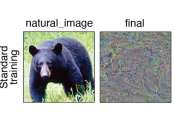A model (from Middle French modèle), sometimes called a mannequin, is a person who is employed for the purpose of displaying and promoting fashion clothing or other products and for advertising or promotional purposes or who poses for works of art.
Modeling is distinguished from other types of public performance, such as an acting, dancing or mime artistry, although the boundary is not well defined. Appearing in a movie or a play is generally not considered to be modeling, regardless of the nature of the role. However, models generally have to express emotion in their photographs, and many models have also described themselves as actors. Models are generally not expected to verbally express themselves unless to visually enhance a photograph through the display of intense emotion.
Types of models include fashion, glamour, fitness, bikini, fine art, and body-part models.
Not all models are what would commonly be considered "beautiful": character models portray ordinary people and humorous types, mostly in print work and in commercials. Photo manipulation and cosmetic surgery also enable people with body imperfections to model and change their looks to suit a certain role. Many high fashion models have what could be called 'quirky' attributes and memorably unusual faces. High end brands often use these unusual faces as people are likely to remember their brand name and associate it with an interesting face.
Various representations of beauty and fashion using models have caused controversy and is known to have some social impact, particularly on young people - both male and female.
Male models receive overall less publicity and are often paid less than female models.









